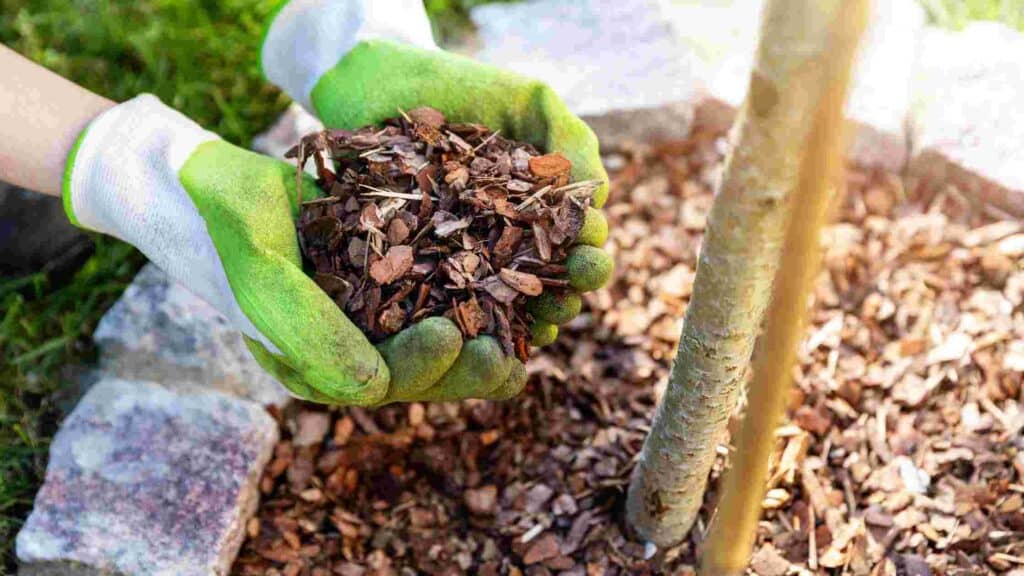In this article, we’ve got some fantastic tips on how to keep weeds out of mulch!
We all know the struggle of dealing with those weeds invading our beautiful gardens. Not only do they ruin the look of our little green paradise, but they also mess with the health of our precious plants and flowers.
How To Keep Weeds Out Of Mulch
So, what can you do to ensure those weeds don’t stand a chance against the mulch? Here are some tactics:
1. Using A Weed Barrier
Let’s talk about using the black plastic weed barrier. This is an effective solution to keep those weeds at bay and your garden looking fabulous.
Black Plastic Weed Barrier
This is a dark, impenetrable shield beneath your mulch, thwarting the sun’s attempts to give those weeds a fighting chance.
That’s what the black plastic weed barrier is all about! But before you use it, clear the ground by removing the weeds and digging up any stubborn roots with your trowel.
Secure The Perimeter
With your ground cleared, it’s time to spread that black plastic weed barrier over the entire area where you will be putting on the mulch.
Custom-cut holes in the plastic to fit over existing plants like a glove. And don’t forget to create openings for new plants.
Mulch It Up

Now comes the final touch – cover the black plastic weed barrier with a lush 3-inch layer of mulch (check out: how deep should mulch be?).
Hide that plastic away, and let the mulch take care of the rest! Avoid using plastic barriers if you’re planning to raise shrubs or trees. Those roots need their fair share of water, after all!
Eco-Friendly Alternatives
If plastic isn’t your style, there are greener options to choose from. Landscape fabric barriers can last up to five years, depending on the type you pick.
Or go the extra eco-mile and use newspapers for the barrier – just be ready to replace them more often, as they’re quite the biodegradable option!
2. Use The Right Mulch For Maximum Impact
Not all mulches are created equal. Use top-notch mulch made from bark, wood chips, or sawdust. These will stand the test of time, needing replacement less often, and fighting weeds.
On the other hand, mulch made from shredded leaves, grass clippings, or straw may not have the same impact – so choose wisely!
Top Up When Needed
Remember, mulch doesn’t last forever. The sun, wind, and time will chip away at its strength. So, regularly replenish that mulch layer! If it gets too thin, it won’t be able to block out the sun’s rays and keep those leaves at bay.
You may also be interested in learning about when is the best time to mulch.
Why Is Mulch Important
Let’s talk about why mulch is the real deal for gardening.
Picture this: a layer of mulch keeping your soil cool and moist during those blazing summer months while acting as a protective layer for your plants during the winter (here’s how to get rid of winter weeds). It’s like nature’s own climate control system for your garden!
Mulch keeps the sun from drying out your soil, meaning less time spent watering and more time relaxing with your thriving garden (read more about what is mulch).
When mulch eventually breaks down, it enriches your soil with all those essential nutrients your plants crave. Plus, let’s not forget, mulch can be quite the looker, adding that extra touch of charm to your garden’s aesthetic.
Alright, now let’s get to how mulch takes on those weeds! One of the top reasons we use mulch is its fantastic ability to curb weed growth.
The mulch creates a protective barrier, making it tough for new weed seeds to find a spot in your soil and sprout up. It also makes it hard for those existing weed seeds, keeping them dormant and out of your garden (check out how to kill thistle weeds).
3. Pre-emergent Herbicides

These keep weed sprouts at bay. Apply the pre-emergent herbicide before the weeds even think about making an appearance. Timing is key here.
Liquid Herbicides
Liquid herbicides, unlike their solid counterparts, stick to the mulch instead of vanishing into thin air. You want that herbicide to stay put, right where it’s needed (find out our top pick for the best weed killer for lawns).
Follow The Product Instructions
Read the instructions on the product label as if your garden depends on it – because it kind of does. Make sure it’s safe for the plants you’re growing, and follow the recommended application schedule, usually every 5 to 6 months.
FAQs
1. What can I put in my mulch to prevent weeds?
You can put a layer of weed barrier fabric or newspaper underneath your mulch to prevent weeds.
2. How do I kill weeds in my mulch bed but not the flowers?
Use a selective herbicide, applied carefully, or hand-pull weeds to avoid harming flowers in the mulch bed.
3. Can you put vinegar on mulch for weeds?
Yes, vinegar can be applied to mulch to kill weeds, but it may also affect nearby plants, so use it with caution.
4. How do you permanently stop weeds from growing?
To permanently stop weeds, combine methods like weed barriers, regular mulching, hand-pulling, and targeted herbicides.
You might also be interested in checking out the best corded electric weed eater.
5. How to keep weeds out of mulch around trees?
To keep weeds out of mulch around trees, use a thick layer of mulch and periodically inspect and remove any emerging weeds by hand (be sure to use the best weeding tool).
Conclusion: How To Keep Weeds Out Of Mulch
While we cannot guarantee a completely weed-free lawn, following these tips will undoubtedly enhance the beauty of your garden (find out how to kill grass and weeds).
Your mulch-laden garden will be able to take care of weed management, establishing a landscape that’s the envy of the neighborhood.
So, gather your gardening tools, embrace the black plastic or eco-friendly alternatives, and let the mulch do its work! Happy gardening!
